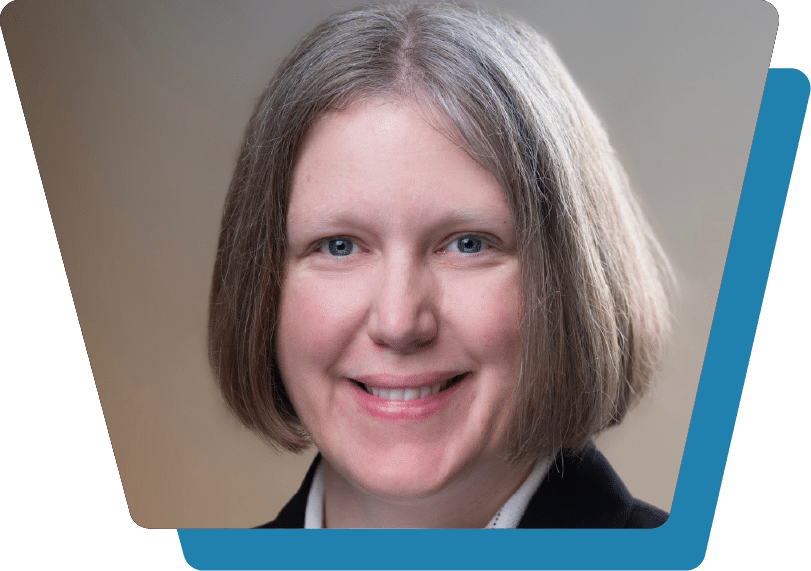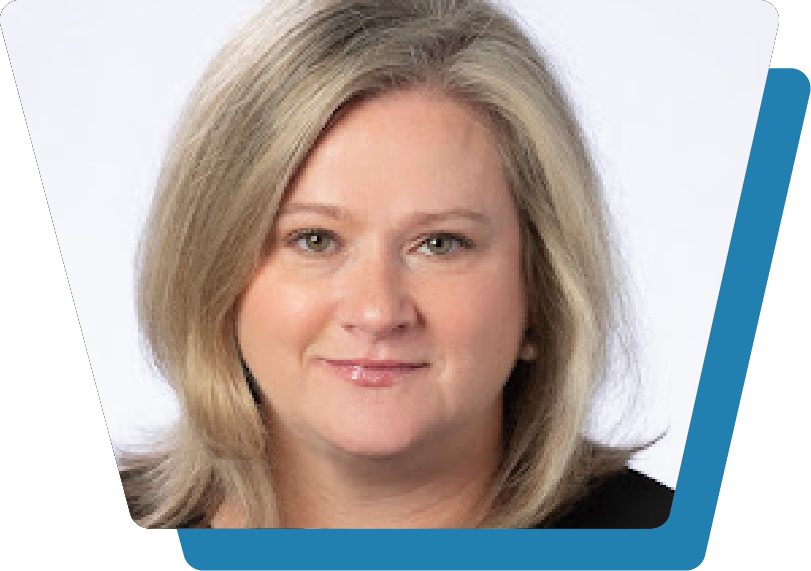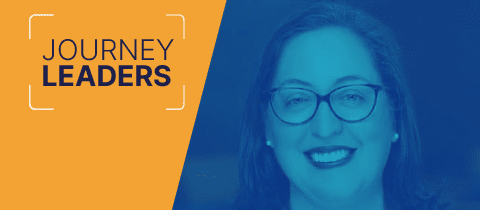At DREAM 2025 in February, Achieving the Dream continued its annual tradition of inviting DREAM Fellows to attend the conference, where they learned from and connected with other professionals dedicated to community college student success.
DREAM Fellows are doctoral candidates in the Community College Leadership program in North Carolina State University’s College of Education. They also actively work in leadership positions within higher education. In partnership with the NC State Belk Center, ATD selects a cohort of these students through a competitive application process to attend DREAM each year. In 2025, the eighth cohort of DREAM Fellows included:
- Beth Brehler, associate vice president of student success at Alamance Community College
- Christie McCray, program manager for the Master of Biomedical Science (MBS) degree program at Duke University School of Medicine
- Adam Wade, dean of student onboarding and success at Central Carolina Community College
- Amanda Jewett Zekanis, institutional researcher at Johnston Community College
Following their experience at DREAM, each fellow developed a proposal for an educational program, policy, or priority that incorporated one of DREAM’s key themes — access, momentum, mobility, and community vitality — with their own doctoral research and professional interests. Three of the four DREAM fellows presented these proposals to staff from ATD and the Belk Center at the end of March. Their presentations outlined goals, potential benefits, and possible challenges of their proposed programs. (Note: Christie McCray was unable to share her presentation at the time.)
‘Techquity’ for rural learners
Amanda Jewett Zekanis, an institutional researcher at Johnston Community College, was inspired by presentations at DREAM that focused on leveraging community colleges as partners for economic mobility. Focusing on the role of college as partner, she sought to address a widespread lack of broadband access that has a profoundly negative effect on rural college students with her proposal, “Bridging the Technical Divide: AI-Enhanced ‘Techquity’ for Community College Students.”
In a state where 40 of 58 community colleges serve at least one rural county, prioritizing access for rural learners is critical. Amanda’s approach: To introduce AI-supported device lending and real-time connectivity solutions that help students access, persist, and succeed in community college. The program proposal involved four steps:
- Assess digital access gaps through traditional intake surveys as well as new AI analytics that map students’ internet usage. By understanding students’ self-reported tech needs and analyzing user behavior (such as the types of devices students are using or when they’re logging in), colleges are better equipped to fill gaps and support the learners with the greatest opportunity for connectivity improvement.
- Set up a lending program supported by AI programs that can predict device demand, prioritize lending for students with the greatest need, and automate reservations.
- Improve real-time connectivity by adding hotspots throughout campus, using AI chatbots to help connect students to low-cost internet plans, and making the institution’s website and learning management system mobile-friendly.
- Pilot and scale the program using both traditional tracking methods like dashboards and AI-enabled analytics.
Amanda highlighted her proposal as an affordable, efficient way to improve persistence and completion. It would also have the added benefit of improving college employees’ digital skills and encouraging cross-department collaboration, all while addressing one of the biggest challenges among rural colleges: broadband infrastructure that’s reliable and affordable for all students.
Stronger pathways for HSE students
Beth Brehler, associate vice president of student services at Alamance Community College (ACC), enjoyed sessions at DREAM centered on the importance of data-driven decision-making. When she returned from the conference, she looked at state-, county-, and institutional-level data to determine where she could attempt to make the biggest difference.
At ACC, only 27% of graduates from the college’s high school equivalency (HSE) courses subsequently enroll in higher education, below the state average. Combining this data with state- and county-level metrics, Beth proposed “HSE Forward: A Pathway to Success,” a program aimed at guiding HSE graduates from enrollment to employment. This proposal dovetails with ACC’s 2022–2027 strategic plan and includes four elements:
- Structured onboarding and support. This includes career assessments from the beginning of a student’s time at the college and a customized first-year experience course that embeds material unique to HSE graduates.
- Financial incentives and stability. ACC currently offers HSE graduates one free class; the college could increase this incentive by assigning students a financial coach who provides further support and resources.
- Academic and career success. Beth proposed a dedicated HSE (or adult learner) hub in an existing campus building where many advising staff already have offices. This “one-stop shop” would make it easier for students to access support and could enable an expansion of existing mentorship programs.
- Holistic support and engagement. In addition to the proposed “one-stop shop,” the HSE program would focus on recognizing students’ achievements. By highlighting success stories around campus, the college would not only foster a sense of belonging and pride in students whose accomplishments are being recognized but encourage others to participate as well.
While Beth recognized the potential risk of recruitment and retention challenges, she emphasized that this proposal has great potential for streamlined recruitment: It targets students who are already on campus. With the right implementation and support, “HSE Forward” could strengthen learning pathways for HSE learners and help North Carolina meet its educational attainment goals.
Flexible schedules for adult learners
Adam Wade, dean of student onboarding and success at Central Carolina Community College, proposed a program that focused on centering the student voice in course scheduling. He was inspired by a session he attended at DREAM presented by SUNY Westchester Community College: “Don’t Just Roll With It: Creating a College Schedule To Support Student Success.”
Using SUNY Westchester’s findings as a model and incorporating his own research, Adam proposed “Flex Forward,” a strategy to support adult learners by reimagining course formats, schedules, and holistic supports — all while centering the student voice.
For adult learners in particular, Adam identified barriers to enrollment and retention in the form of low flexibility: Many adults have a career goal and want to earn a credential, but their local community college doesn’t offer pathways to that goal that fit into their lives. “Flex Forward” would provide maximum flexibility and high-touch support, with particular attention for the needs of adult learners, through a few key strategies:
- Moving college courses to a hybrid-flexible (HyFlex) model. This transition could be supported by playbooks that the Belk Center and New America have released.
- Offering personalized support to adult learners. This would include peer mentors as well as “education navigators,” dedicated staff members who can connect students to the resources they need.
- Allowing students to schedule courses up to a year out. Adam cited data from Alamo Colleges’ Full Academic Year Registration showing this can be an effective approach, as it allows students to map their educational journey more thoroughly.
- Centering the student voice. By soliciting ongoing feedback about course schedules and formats, the college can ensure it understands and responds to students’ needs, building processes that help adult learners succeed.
Adam recognized that such a large change to course scheduling would require a cultural, whole-college transformation. The most important part of this transformation would be strong communication: Leaders behind the process will have to explain the “why” behind this effort and share student stories that showcase the positive impact this change can have on adult learners.
Each of the DREAM Fellows shared ideas that envision community colleges not just as providers of education, but as essential hubs for economic mobility, equity, and community vitality.
As ATD President and CEO Dr. Karen A. Stout mentioned before these presentations, the work of community college transformation starts with leaders like the DREAM Fellows.
“You are bringing practice-based, evidence-based thinking into the field in a way that is unique and is much needed to keep the student success movement going,” Dr. Stout said.
Though the DREAM Fellows are just one small part of ATD’s partnership with the Belk Center, they represent the future of college transformation — and help others in the field envision a brighter, bolder version of that future.





